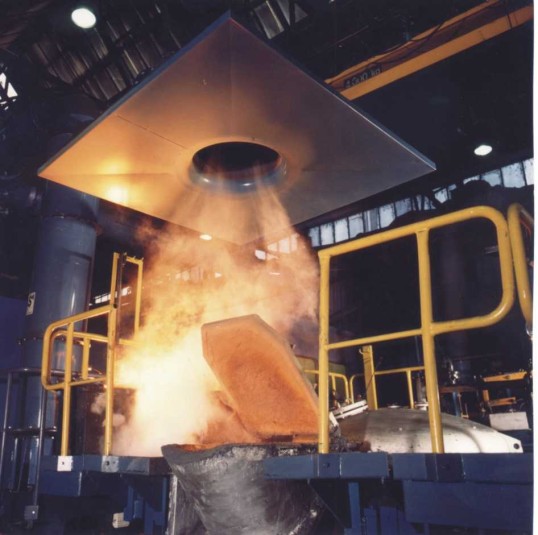- Missions of the IFA
- Fields of activity
- Organisation
- How to find us - Address - E-Mail
- Impressum
Protective Measures, Indoor Climate, Indoor Workplaces

Smelter suctioning
Source: Thyssen Krupp HiServ
The focal points of the work in the "Protective measures, indoor climate, indoor workplaces" section of the department Hazardous Substances: Handling - Protective Measures are
-
Consulting and investigation
In conjunction with the German Social Accident Insurance Institutions, consulting and investigation are conducted in companies and plants with regard to technical protective measures, and the protective measures taken are evaluated and optimized. -
Hazardous substance emissions
Emissions of hazardous substances (such as dioxins, welding fumes, cooling lubricants) are determined in the course of prevention activity by means of in-plant workplace investigations, and measures recommended for their reduction. -
Cooling lubricants
The cooling lubricants portal provides comprehensive information on these substances, for example regarding their properties, activities involving them, and the regulations governing them. One purpose of the portal is to provide support during risk assessment of activities involving cooling lubricants. -
Asbestos exposure
Methods entailing low exposure during demolition, redevelopment and maintenance work involving asbestos are assessed and published in the form of DGUV informative publication 201-012 (formerly: BGI 664). -
Ventilating and air-conditioning systems
Existing ventilating and air-conditioning systems are evaluated (for example by means of tracer gas measurements) and optimized. Consulting may also be conducted before new ventilating systems are purchased. -
Room climate
Investigations of the room climate are conducted in areas of thermal comfort, and at cold and hot workplaces. -
Indoor workplaces
The assessment of indoor workplaces includes the aspects of room climate, indoor hazardous substances, and ventilation. A recommended procedure for study of the work environment at indoor workplaces has been drawn up for the handling of complaints. -
Research and development
Exemplary studies are conducted to optimize emission reduction measures. Specific concepts for emission reduction measures are also developed, for example for the handling of cooling lubricants, pouring of solid substances, thermal spray-coating and laser treatment.
More information
(in German only)

Further reading
Contact
Dr Simone Peters
Fax: +49 30 13001-38001
Email
Hazardous substances: handling, protective measures
Tel: +49 30 13001-3320Fax: +49 30 13001-38001